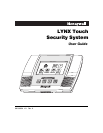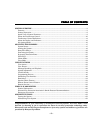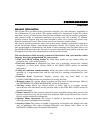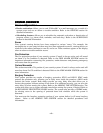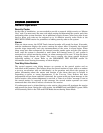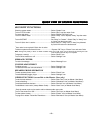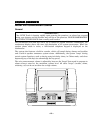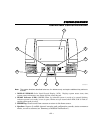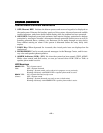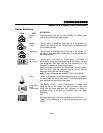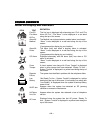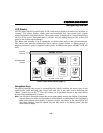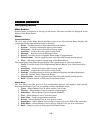
– 6 –
SYSTEM OVERVIEW
SYSTEM OVERVIEWSYSTEM OVERVIEW
SYSTEM OVERVIEW
General Operation
• Device activation: Allows you to send “Follow-Me” or e-mail messages, as a result of a
system event such as an alarm or trouble condition. Refer to the DEVICES section for
detailed information.
• Scheduling feature: Allows you to schedule the automatic activation or deactivation of
program events (e.g. alarm clock, reminder, and latch key). Refer to the SCHEDULES
section for detailed information.
Zones
Your system's sensing devices have been assigned to various "zones." For example, the
sensing device on your entry/exit door may have been assigned to zone 01, sensing devices on
windows in the master bedroom to zone 02, and so on. These numbers appear on the display
when an alarm or trouble condition occurs.
Fire Protection
The fire protection portion of your security system (if used) is always active and will sound
an alarm if a fire condition is detected. Refer to the FIRE ALARM SYSTEM section for
important information concerning fire protection, smoke detectors and planning emergency
exit routes from the premises.
Carbon Monoxide
The carbon monoxide (CO) portion of your security system (if used) is always active and will
sound an alarm if a CO condition is detected. Refer to the FIRE ALARM SYSTEM section for
more information.
Burglary Protection
Your system provides two modes of burglary protection: STAY and AWAY. STAY mode
protects the perimeter only, allowing you to freely move inside the premises. AWAY mode
protects the entire system. Both modes provide an entry delay time that allows you to
reenter the premises without setting off an alarm. For additional security, you can turn the
entry delay off when arming the system. Refer to the ARMING THE SYSTEM section. The
system also allows you to bypass selected zones before arming the system, if desired. Refer to
the BYPASSING PROTECTION ZONES section. The system also provides a CHIME mode,
for alerting users to the opening of protected doors and windows while the system is
disarmed.
You must arm the burglary protection portion of your system before it will sense burglary
alarms. Refer to the ARMING THE SYSTEM section for detailed procedures and
information.



